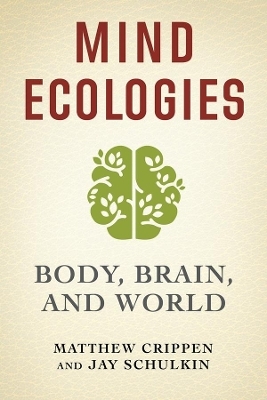
Mind Ecologies
Columbia University Press (Verlag)
978-0-231-19024-4 (ISBN)
Pragmatism—a pluralistic philosophy with kinships to phenomenology, Gestalt psychology, and embodied cognitive science—is resurging across disciplines. It has growing relevance to literary studies, the arts, and religious scholarship, along with branches of political theory, not to mention our understanding of science. But philosophies and sciences of mind have lagged behind this pragmatic turn, for the most part retaining a central-nervous-system orientation, which pragmatists reject as too narrow.
Matthew Crippen, a philosopher of mind, and Jay Schulkin, a behavioral neuroscientist, offer an innovative interdisciplinary theory of mind. They argue that pragmatism in combination with phenomenology is not only able to give an unusually persuasive rendering of how we think, feel, experience, and act in the world but also provides the account most consistent with current evidence from cognitive science and neurobiology. Crippen and Schulkin contend that cognition, emotion, and perception are incomplete without action, and in action they fuse together. Not only are we embodied subjects whose thoughts, emotions, and capacities comprise one integrated system; we are living ecologies inseparable from our surroundings, our cultures, and our world. Ranging from social coordination to the role of gut bacteria and visceral organs in mental activity, and touching upon fields such as robotics, artificial intelligence, and plant cognition, Crippen and Schulkin stress the role of aesthetics, emotions, interests, and moods in the ongoing enactment of experience. Synthesizing philosophy, neurobiology, psychology, and the history of science, Mind Ecologies offers a broad and deep exploration of evidence for the embodied, embedded, enacted, and extended nature of mind.
Matthew Crippen is an associated researcher with the ARTIS–Group at the Berlin School of Mind and Brain, Humboldt-Universität zu Berlin. He is also a visiting professor at Grand Valley State University. Jay Schulkin is a research professor in the Department of Neuroscience at Georgetown University. He is the author or coauthor of numerous books, including The Brain in Context: A Pragmatic Guide to Neuroscience (Columbia, 2019), with Jonathan D. Moreno.
Preface and Acknowledgments
Introduction
1. Life, Experimentalism, and Valuation
2. Pragmatism and Embodied Cognitive Science
3. Social Cohesion, Experience, and Aesthetics
4. Pragmatism and Affective Cognition
5. Perception, Affect, World
6. Broadening Ecologies
Appendix 1: Subcortical Structures of the Brain
Appendix 2: Cortical Structures of the Brain
Notes
Bibliography
Index
| Erscheinungsdatum | 08.10.2020 |
|---|---|
| Verlagsort | New York |
| Sprache | englisch |
| Maße | 152 x 229 mm |
| Themenwelt | Geisteswissenschaften ► Philosophie ► Philosophie der Neuzeit |
| Naturwissenschaften ► Biologie ► Humanbiologie | |
| Naturwissenschaften ► Biologie ► Zoologie | |
| ISBN-10 | 0-231-19024-7 / 0231190247 |
| ISBN-13 | 978-0-231-19024-4 / 9780231190244 |
| Zustand | Neuware |
| Informationen gemäß Produktsicherheitsverordnung (GPSR) | |
| Haben Sie eine Frage zum Produkt? |
aus dem Bereich


